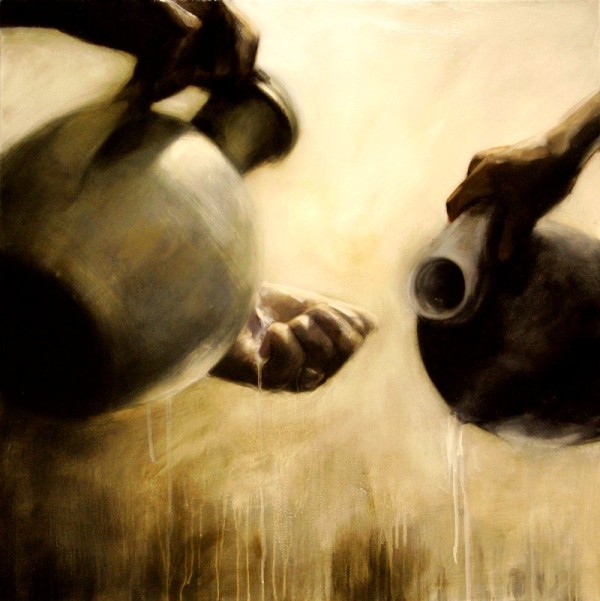
Ten Things I see from
the Division Street Bus, 1967
1. The
young man in a white T-shirt
and black slacks puts his right
hand
into his pocket and stands on
the corner
of Division and California .
His left hand holds a paper
shopping bag
from the A & P. He looks down Division
as if waiting for someone, and
she’s late.
2. A
black man with a necklace of plastic
baby dolls, every one of them as
naked
as baby Jesus, dances in front of
the bank.
He is singing that every time it
rains
it rains pennies from heaven,
heaven.
I love these songs sung by men
with no wives,
no homes, no dinners of
southern-fried steak
and mashed potatoes, no dreams of
anything
but this gray sidewalk and a
foolish dancing step.
Songs like this will let a woman
in a blue scarf
with yellow flowers know that he
too is someone
without hope or dreams. This song will urge her
to take him home and sit him down
at a table
that smells like some Sunday
afternoon dinner
he will always remember, even in
the moments
before he dies, no matter how he
dies or where.
3. And
with him dances his chicken. A beat
red rooster he found in Humboldt Park
in the bushes at the southwest
entrance
to the park next to the statue
called Home,
a statue of a father kneeling to
embrace
his daughter, his lunch pail
chiseled like him
from rock that will last as long
as fathers
come home and their children wait
for them.


4. The
bus speeds up, travelling eastward,
toward the lake it never reaches
because the route bends south on State Street .
5. A
seventeen- or eighteen-year old girl
walks past
Pierce’s Deli. In her heart, she carries
a secret she
fears will make the boy she loves
angry. If she could find some way to tell him
that wouldn’t
hurt him, she’d say a rosary
to the Blessed
Virgin this Sunday after mass.
6. There’s
Polack Joe going into the bar
next to the New
Strand Movie Theater.
If this were ten
years ago, I would say
he’s looking for
his father Dulek, a drunk
who survived the
killing on Monte Cassino
so he could
drink too much and run naked
like a crazy man
in the streets. So long, Joe.
7. A
school girl in a plaid-green skirt circles
around and
around her little brother,
her arms spread
wider than she’ll ever be,
wider than her
mother’s love, and wider
than the
white-checkered table in their kitchen.
She’s going
faster, and making a roar-
ing noise like
wind in the winter pines,
and her brother
shouts, “Danusha, please stop,
you’re making me
dizzy and I’ll fall!”
8. A
man stands waiting for the bus.
As it angles toward
the corner,
the driver sees
he has no eyes,
not even dark
glasses or an old rag
to protect the
passengers from this sight,
just the empty
mouths of his sockets,
Red like the
chicken I saw dancing
with the singing
black man. The doors open
and the blind
man gets on. His feet
are sure, so is
his hand grasping the rail.
He drops a
quarter in the coin box,
and asks the
driver to call out Ashland .
The driver looks
square in his eyes
and says,
Mister, you ought to put
something over
your eyes.
9. Two
well-dressed men shake hands
in front of the Russian-Turkish
Bath.
The younger man is smiling and
saying
something quickly, the older man
laughs
and we can all hear it in the bus,
even with the traffic that grinds
toward Milwaukee with its Polacks,
Jews, Puerto Ricans, Austrians
Mexicans, Italians, Ukrainians,
even farm boys and their wives and
children
from someplace in Mississippi
where the levee broke ten years
ago
and cursed the family to a life
of geographical evolution,
toward this city and the shopping
they’ll all be doing on Milwaukee .
10. At the
dreaming center of Chicago
is an island formed by the
intersections
of Milwaukee ,
Division, and Ashland .
Once, Indians stripped the skins
off buffaloes
here, and lived in huts children
have been taught
to call hogans. The driver calls the stop,
and the blind man is first to
leave the bus,
thanking the driver for his
courtesy.
A woman presses the blind man
forward.
She’s in a hurry, and he
understands.
His grip is still sure on the rail
and he’s
getting off as fast as he
can. I’m behind him,
and I’m behind her and leave the
bus in turn
walking quickly to the subway
entrance.
A legless man sitting on the
sidewalk
raises his wool cap to me and in
Polish
offers me a pencil. Like my mother taught me,
I toss a quarter in his cap and
say in Polish,
“Thanks, but you keep the
pencil. I’ve got plenty.”
_______________
The photo of Nelson Algren walking on Division Street is by Chicago photo journalist Art Shay.


